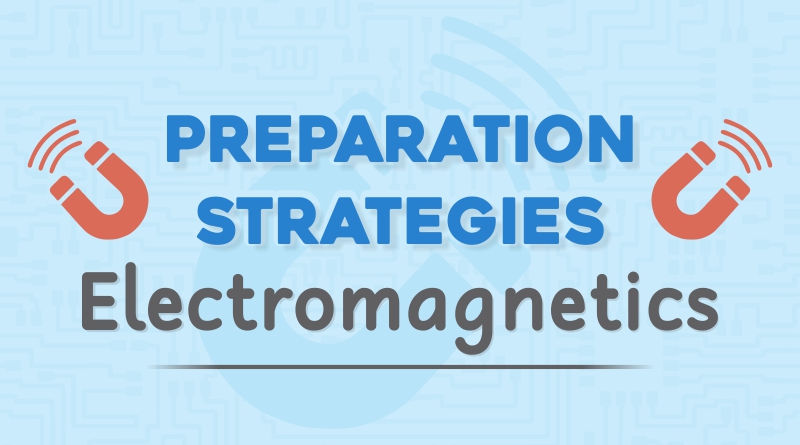Electromagnetics: Preparation Strategies
ESE exam and GATE are two of the most sought-after exams among technical graduates. They provide opportunities for graduates to work within their technical boundaries for the government along with all the facilities, dignity, and career growth that an individual may seek or to study further in their technical domain to aspire for better career prospects and growth chances. To clear the GATE or ESE exam in minimal time though, it is inevitable that one follows the correct preparation strategy for IES Preparation or best GATE preparation tips. For Electrical and Electronics and Telecommunication engineers, Electromagnetics is one of the important core topics that one cannot skip when it comes to IES exam preparation or GATE preparation.
However, to spend a lot of effort and time in preparation for anyone subject is a waste of both and must be avoided at all costs. It is always a good idea to strategize and plan your preparation before starting it. In lieu of the same lines, we try to present the preparation strategy for Electromagnetics in this blog so that aspirants get an idea of what exactly is important from an ESE exam point of view or to prepare for GATE and can plan their studies accordingly.
Why study Electromagnetics:
The weightage of Electromagnetic theory in the ESE exam for Electrical engineering in the preliminary stage is 14 to 20 marks, where easily an aspirant can find 7 to 10 MCQ from Electromagnetism basics and advanced Electromagnetics. The Main stage of ESE exam is estimated to have approximately 25 to 50 marks from Electromagnetics. The level of questions in ESE exam is moderate whereas questions asked in GATE exam are more mathematical in nature. But since the syllabus has got updated for the ESE exam, the GATE and ESE exam syllabus has become more or less the same now. With 2 to 3 questions in GATE exam g asked from this topic have a weightage of around 5 marks, Engineering Electromagnetics is a great deal for aspirants preparing for either of the exams or both as number of input study hours required for Electromagnetics is very less and accordingly, the number of questions that are put up from this topic is fairly high. Also, since Electromagnetics basics are highly mathematic based in nature and most of the Advanced Electromagnetics topics can be learned and remembered through analogy after one topic is understood thoroughly, Electromagnetics becomes a great package deal altogether for all ESE exam and GATE aspirants of Electrical engineering and Electronics and Telecommunication engineering.
Applications of Electromagnetics: Electromagnetics finds a number of applications in various streams of Electrical engineering, some of which have been enlisted here:
- Electromagnetic basics are inevitable to understand a number of basics of transformers and their working. Flux linkage and working of principles of transformers become easy to understand if you are familiar with all Electromagnetism basics.
- Electric Machines, which is an important subject for IES exam preparation and GATE preparation for Electrical engineering graduates also demand proper understanding of Electromagnetic theory and advanced electromagnetics.
- Power Systems is another subject where combined application of Electromagnetic theory and Network theory can help prepare, understand and score well in the subject.
Understanding the physical interpretations of Electromagnetism basics, by visualization and imagination beyond the mathematics that is involved, can help the aspirants to develop fundamentals of the subject and an enhanced understanding of Electromagnetics.
It is necessary to cover all the topics of the subject while preparing since all of them are highly interlinked. To understand any topic of advanced electromagnetics, it is very necessary to learn the electromagnetism basics. We will now see the in-depth analysis of each topic of Electromagnetics and how they can be prepared most efficiently to score the maximum in ESE exam and GATE examination.
About topics: Engineering Mathematics is a pre-requisite to start learning Electromagnetics. Its basics are necessary to understand the mathematical aspects of electromagnetics and solve numerical that come up from this topic. Following is a topic wise list of all aspects covered in Electromagnetics and how they can be tackled most efficiently:
- Electromagnetics basics: In Engineering Mathematics, basics of gradient, divergence, curl, Laplace operations and other basics related to vector operations along with all the relevant formulae are studied in detail. The limitation here is that only rectangular coordinate system is taken in account there, however, in Electromagnetism basics, we need a proper and complete understanding for cylindrical and spherical coordinate systems as well.
Since formulae for all the three coordinate systems are very important and find repeated application throughout the subject, apart from the questions that are put up directly from these topics, it is highly advisable to remember these formulae. You can take help of micro notes, make formulae sheet and revise it often to remember them.
- Static Electric fields: This topic covers Coulomb’s force law, Electric field equations for various charge configurations like: point charge, line charge, surface charges, volume charges and all other geometries, etc. Gauss’s law is another important topic here from which, very frequently questions from Electric fields are put up. Work done and Electric potential are the further developments in this topic.
The complete topic can be learnt with help of application of knowledge of Electromagnetism basics and Engineering mathematics. The topic includes derivations, numerical and is very mathematical in nature. Only practice can help aspirants get the strongest command on this topic.
- Types of Materials: Different types of materials that can produce or be put in fields are covered via this topic. Dielectric materials which produce displacement current and conductors which produce conduction current are the two major topics of interest. Continuity equation for conductors and Capacitance formulae and equations of capacitance for various configurations of dielectrics are very important and must be remembered. Laplace and Poisson’s equations are also asked frequently in GATE and ESE exams. Questions may be formed about Voltage and Electric field equations for some configurations, using Laplace and Poisson’s equations.
Since this particular topic is not related directly to any other topics of Electromagnetics and is highly memory-based in nature, aspirants can keep it for the end or tackle it through micro notes and previous year questions only.
- Static Magnetic Fields: This topic is exactly the same as the previous one and can be very easily learnt using complete analogy. As voltage causes Electric field, the same way, current causes magnetic field so the simple analogy helps in learning all the formulae and understanding this chapter completely. The only differences that you may find here and there are that the vector potential replaces the scalar potential, in place of capacitance, in case of Electric fields, we would now see about inductance.
Repetition of the same discussion, replacing charge with current, Electric field with Magnetic field, accumulation with flow, etc. helps in proper registration of all the concepts in one’s brain. Also, this kind of associative learning helps in revision of both the chapters, whenever you revise any of them.
- Maxwell’s equations: Having gained complete knowledge about static fields in the previous topics, this topic throws light on time varying fields. The four Maxwell’s equations come from Faraday’s law, Ampere’s circuital law, Gauss’s law and Gauss’s law of Magnetic field. The equations are derived separately for both static as well as time-varying fields.
This topic, thus, puts together the knowledge of all the previous topics and all of them are applied together here. Maxwell’s equations are generally not focused exclusively, on GATE, but sometimes in combination with other questions or in matching type questions you may sometimes find questions from this topic.
Also, Faraday law is important for Electrical engineering graduates, so even if you don’t wish to work a lot on the applications part of this topic for GATE, you can at least remember all the formulae pertaining to the same. In ESE exam though, both objective type and conventional questions of substantial weightage are put from this topic.
Though it’s not advisable to read a lot of books while one is preparing for competitive exams like GATE or ESE exam, but there are some instances where an aspirant gets confused and needs to refer a book for clarity. Few books have been listed, for the students to refer if they ever find themselves stuck while studying.
References: When preparing for ESE exam or during GATE preparation, to learn about electromagnetics, one can refer to Sadiku, for both theory as well as practicing numerical. Schaum’s series is another reliable study source to refer for preparation. Though, it is highly advisable to form one’s own notes and short notes for proper practice, understanding and revision later. In case of any doubt or discrepancy, one may refer to above books. Especially for topics that have high weightage for GATE and ESE exams, one should also go through the questions and solved examples of these books.
Extra tips: After planning and strategizing for the ESE exam properly, it is equally necessary to work upon the implementation of the plan and preparation strategy for ESE exam and GATE exams. Electromagnetics is generally considered a tough subject since most of the students are unable to comprehend and understand it during their graduation days. This leads to students tending to leave this subject even when it comes to GATE preparation or ESE exam.
This is not advisable though, since the weightage of the subject is pretty high with less study hours required. With proper imagination and understanding through good material, guidance and resources, it is easy to prepare and score well in Electromagnetic theory. Following are some additional tips to add on to your preparation for Electromagnetics:
- After completion of each chapter, try to revise the concepts given in classroom or studied by self on the same day itself.
- Revise the first class or your first study session before you take the second one. It helps the brain to interlink the information better.
- Plan proper revision of the complete subject after completion of course.
- Classroom notes and micro notes, both must be made properly and by oneself to aid proper revision at the end.
- Go through your micro notes as often as possible to remember and refresh all the formula sheet.
- Before you appear for any test of Electromagnetics, go through the micro notes and keep on doing value addition to hem after every test.
- Solve problems on time varying fields as much as possible.
- Don’t fall for unverified sources of study. Apart from the reference books stated, you can refer to the theory book and question banks for practice.
- After successive revisions, it is important to appear for test series. It includes different level of questions which increases understanding of each topic and each concept.
- Topic wise subject tests helps one in identifying one’s weak areas, work upon them and also, compare with different students.
It’s easy to concentrate on either speed or accuracy at once but what ESE and GATE exam demands is concentration on accuracy in a stipulated time. Practice and test series can help you achieve both. We hope this blog helps you with the preparation strategy for Electromagnetics for ESE exam.
All the best for your preparation!
Dear Aspirants,
Your preparation for GATE, ESE, PSUs, and AE/JE is now smarter than ever — thanks to the MADE EASY YouTube channel.
This is not just a channel, but a complete strategy for success, where you get toppers strategies, PYQ–GTQ discussions, current affairs updates, and important job-related information, all delivered by the country’s best teachers and industry experts.
If you also want to stay one step ahead in the race to success, subscribe to MADE EASY on YouTube and stay connected with us on social media.
MADE EASY — where preparation happens with confidence.





Thank you so much for your suggestions.